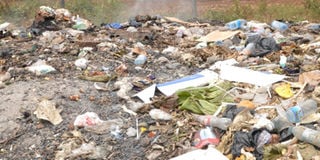Prime
Hospital operates without incinerator for 30 years

Some of the waste being burnt in the open space within Nakaseke Hospital premises last week. Photo by Dan Wandera
NAKASEKE- As she sits on a mat under a mango tree outside the hospital, 82-year-old Dorotia Nakiwolo wants to have her lunchtime meal as she inhales fresh air but the odour around her is unbearable.
Ms Nakiwolo is one of the many patients at Nakaseke Hospital experiencing similar situations.
Unless the Ministry of Health and the district authorities in Nakaseke move fast, poor waste disposal predisposes patients and the residents around Nakaseke Hospital to serious health risks and environmental pollution.
The hospital has been operating without an incinerator for the last 30 years. The incinerators have higher capacity burn rates and should consume the higher volume wastes, including surgical dressings, bed linen and mattresses.
The lack of such a facility means some solid wastes such as used cotton wool, blood stained bandages, surgical gloves and blades, syringes, drip bottles and plastic bottles cannot be disposed of entirely.
Legislators on the Parliamentary Committee on Health were last week shocked to learn that the hospital has been burning medical wastes in the space.
The district, which is part of Luweero Triangle, was the epicentre of the five-year guerrilla war that ushered in the ruling National Resistance Movement (NRM) government to power in 1986 and the area is largely loyal to President Museveni, generously contributing to his vote pool and electing ruling party representatives at various levels.
The Nakasero Hospital administrator, Mr David Ssemakula, says the hospital has not had an incinerator for about 30 years and the contract of a firm supposed to collect and dispose of the wastes expired two months ago.
“We had an incinerator which government donated but never worked. We have been using a private company to manage and dispose of the medical waste, but the contract expired recently,” Mr Ssemakula told legislators at the hospital last week.
The Committee, dispatched to Nakaseke District by the Speaker of Parliament, Ms Rebecca Kadaga, on a fact-finding mission about the Congo Crimean Hemorrhagic fever, was further shocked when the medical staff revealed that the steriliser machine worth Shs1b installed at the theatre after the hospital renovation works in 2016 failed to work.
“The hospital theatre steriliser is almost an obsolete machine because it has not served the purpose. This machine is needed at the theatre. We are helpless and need government intervention,” the Medical Superintendent, Dr Bernard Okello, explained to the Committee led by Mr Michael Bukenya.
The hospital was among those renovated and equipped with modern medical equipment through a Shs5b grant from the World Bank. The renovation works, which began in 2014, were completed in 2016.
Nakaseke South MP Paul Luttamaguzi and the Nakaseke District Woman MP, Ms Sarah Najjuma, were further shocked at the state of the medical equipment at the hospital theatre, including the rusty and dilapidated operating theatre bed which is supported by a broken metal rod.
“You can imagine a patient undergoing an operation on a bed only supported by a broken metal rod. What would happen if the metal rod slips off the bed?” Mr Lutamaguzi wondered.
“It would be a catastrophe to try to hide some of these facts because you fear being reprimanded by superior people in government. We are Members of Parliament who have come to visit you and get some first-hand information on what is happening at the hospital. You do not have to hide some of the problems which hinder the effective delivery of services,’’ Mr Luttamaguzi told the health personnel at the hospital.
According to Ms Najjuma, Nakaseke Hospital needs to be elevated to a regional hospital status because of the overwhelming turn up of patients from more than eight neighbouring districts.
Environment regulation
Improper waste disposal contravenes Section 12(1) of the National Environment Waste Management Regulations, 1998 which states: “An industry shall not discharge or dispose of waste in any state into the environment, unless the waste has been treated in a treatment facility and in a manner approved by the lead agency in consultation with the Authority.”
The Authority in this case is the National Environment Management authority (Nema).
[email protected]




